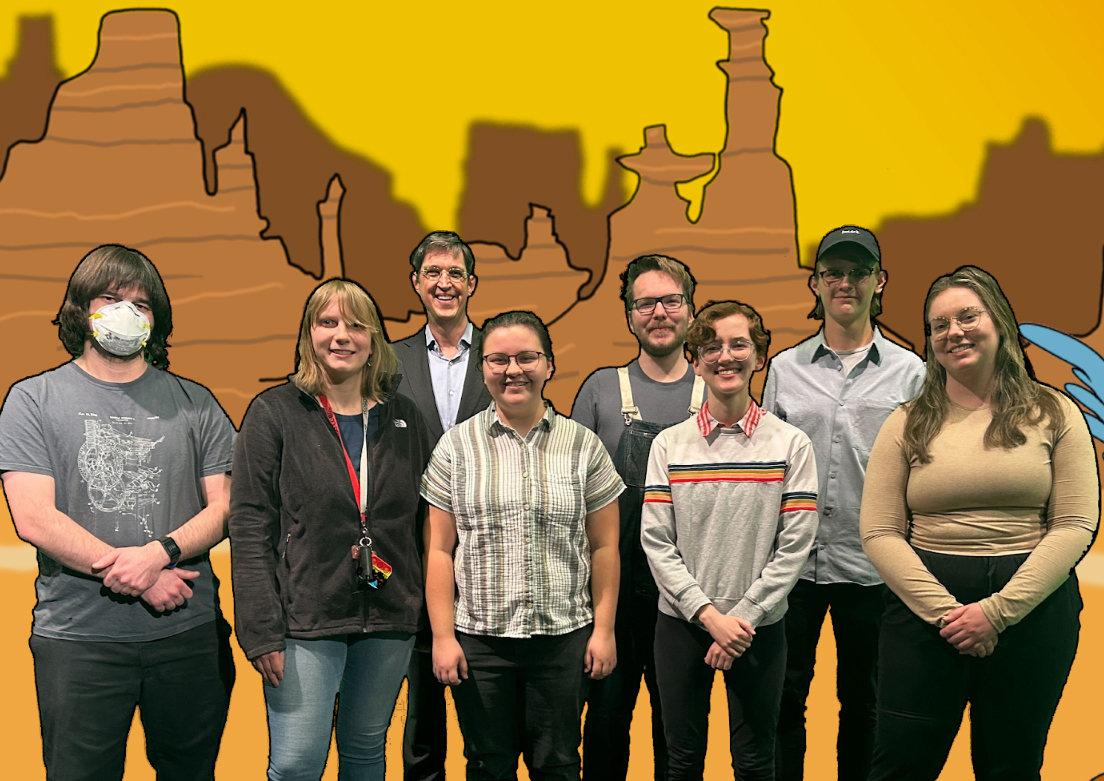Recent News
UNM Engineering names Prabhakar inaugural Cleve Moler and MathWorks Endowed Chair
October 3, 2025
Computer scientist wins Athlete of the Year Award for adaptive skiing technique
May 29, 2025
Hand and Machine Lab wins 2 awards at CHI conference
May 15, 2025
News Archives
UNM computer science students take part in HPC competition
March 3, 2023

Photo courtesy of Stewart Copeland, graphic design by Carter Frost.
By Mariah Rosales
University of New Mexico Research Assistant Professor Matthew Fricke recruited a group of six undergraduate students interested in learning how to build supercomputers with the intention of taking part in two supercomputing competitions in 2023.
Fricke works in the Computer Science Department and at the Center for Advanced Research Computing (CARC), UNM’s supercomputing center.
Qualifications for the students were to have some experience with Linux, have built their own home computer, and have a general love for computers and everything to do with them.
Ryan Scherbarth, a sophomore Computer Science student and the supercomputing team manager, says “When you look at our team, there’s not much more we can do to make it better. We have the best students that you can ask for. Everyone is really skilled in their own zones of expertise which makes us strong.”
Their first competition is the Winter Classic Invitational Student Cluster Competition, which began in mid-February and is scheduled to run through April. Cluster competitions are an opportunity for students to learn to build their own supercomputers, interact with high performance computing (HPC) organizations, and gain experience.
This cluster competition involves mentors from Hewlett Packard Enterprise, NASA, and Oak Ridge National Laboratory's training the students. Twelve teams competing virtually are responsible for learning about their assigned application, practicing and optimizing the application, and then submitting a final scored run of the application to their mentors. After turning in their required application briefs, each team attends a 30-40 minute interview with a panel of competition judges. From there, the judges score each team based on how well they did with each application, how much they learned about the application and HPC, and the quality of their presentation. After the scores are finalized, they are announced, and the teams are awarded from first through 12th place during the Gala Virtual Awards Ceremony.
So far, Scherbarth and his teammates have experienced their fair share of learning curves and difficulties, but are still enjoying putting their new skills to the test.
“Most of us don’t have any experience in HPC at all. It has been fun to experience these elements that we are all unfamiliar with - yet challenging. So, there has been a lot of learning within our team with challenges to get where we are now. But everyone on the team is having a lot of fun, and we’re excited to see how the rest of the competition goes,” says Scherbarth.
Competitions like this are opportunities for the students to deepen their knowledge of Linux and enterprise hardware, which will assist them with future programming-related work. For example, some of the national labs, including Sandia, Los Alamos, Berkeley, Livermore, and Oak Ridge, have some of the largest and fastest supercomputers in existence, and are in need of employees who can run those systems.
HPC helps researchers involved in engineering, data science, and many other disciplines solve large, complex problems. These large-scale computations have revolutionized climate science, astronomy, biology (including COVID-19 research), engineering, and most other scientific fields. Participating in these competitions prepares UNM students to be a part of that revolution.
The UNM team is already eyeing their next opportunity after the Winter Classic competition. The Student Cluster Competition will take place at SC23, the International Conference for High Performance Computing, Networking, Storage and Analysis. This year’s conference will be held at the Colorado Convention Center in Denver, Colorado in November 2023.
Fricke, the UNM’s supercomputing team's faculty advisor, says “Supercomputing is one of UNM’s strengths. UNM has a long history with supercomputing, and we would like to continue that into the future and make sure our students are able to take full advantage of that history and depth of knowledge at UNM.”
